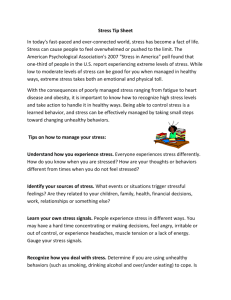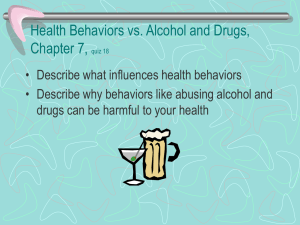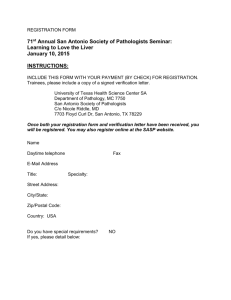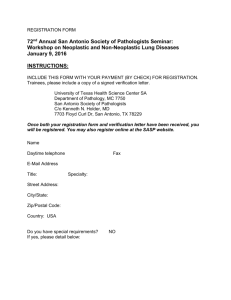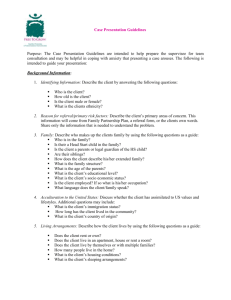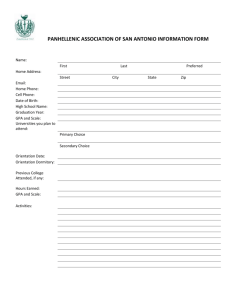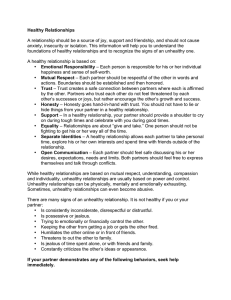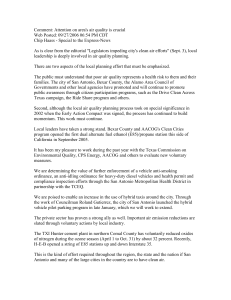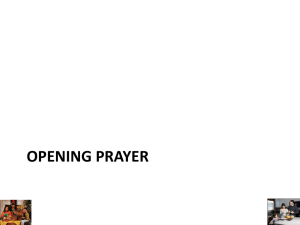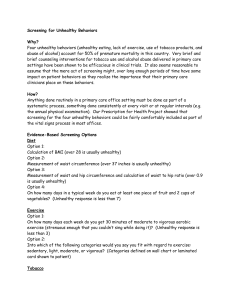Community Health Survey: San Antonio Quality of Life
advertisement
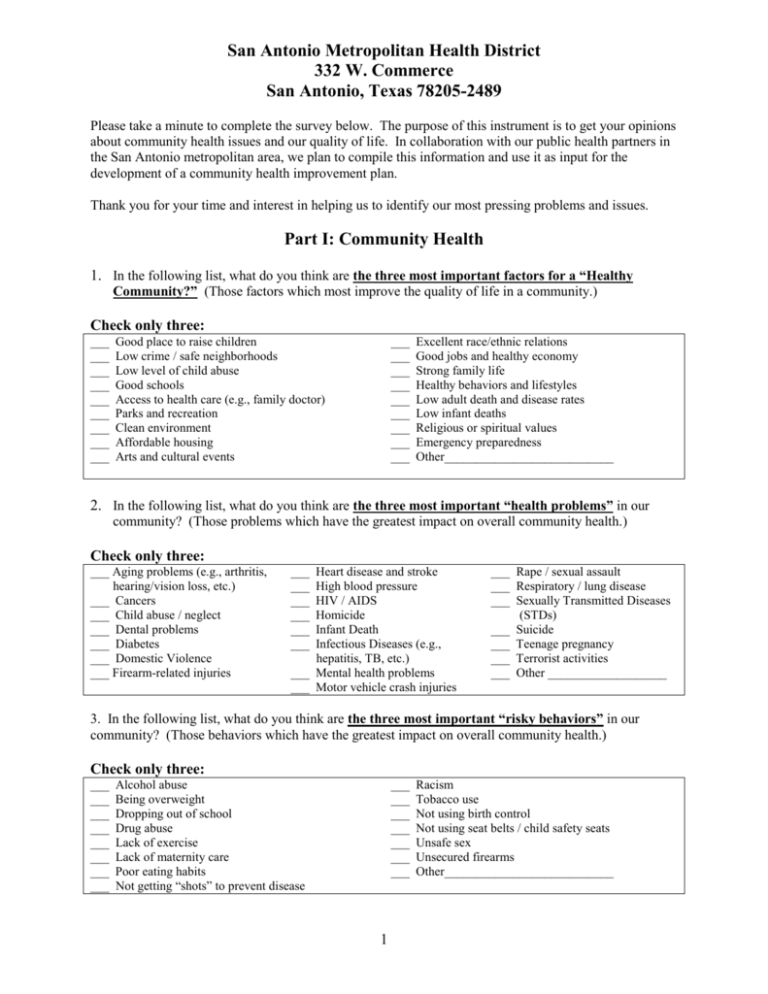
San Antonio Metropolitan Health District 332 W. Commerce San Antonio, Texas 78205-2489 Please take a minute to complete the survey below. The purpose of this instrument is to get your opinions about community health issues and our quality of life. In collaboration with our public health partners in the San Antonio metropolitan area, we plan to compile this information and use it as input for the development of a community health improvement plan. Thank you for your time and interest in helping us to identify our most pressing problems and issues. Part I: Community Health 1. In the following list, what do you think are the three most important factors for a “Healthy Community?” (Those factors which most improve the quality of life in a community.) Check only three: ___ ___ ___ ___ ___ ___ ___ ___ ___ Good place to raise children Low crime / safe neighborhoods Low level of child abuse Good schools Access to health care (e.g., family doctor) Parks and recreation Clean environment Affordable housing Arts and cultural events ___ ___ ___ ___ ___ ___ ___ ___ ___ Excellent race/ethnic relations Good jobs and healthy economy Strong family life Healthy behaviors and lifestyles Low adult death and disease rates Low infant deaths Religious or spiritual values Emergency preparedness Other___________________________ 2. In the following list, what do you think are the three most important “health problems” in our community? (Those problems which have the greatest impact on overall community health.) Check only three: ___ Aging problems (e.g., arthritis, hearing/vision loss, etc.) ___ Cancers ___ Child abuse / neglect ___ Dental problems ___ Diabetes ___ Domestic Violence ___ Firearm-related injuries ___ ___ ___ ___ ___ ___ Heart disease and stroke High blood pressure HIV / AIDS Homicide Infant Death Infectious Diseases (e.g., hepatitis, TB, etc.) ___ Mental health problems ___ Motor vehicle crash injuries ___ Rape / sexual assault ___ Respiratory / lung disease ___ Sexually Transmitted Diseases (STDs) ___ Suicide ___ Teenage pregnancy ___ Terrorist activities ___ Other ___________________ 3. In the following list, what do you think are the three most important “risky behaviors” in our community? (Those behaviors which have the greatest impact on overall community health.) Check only three: ___ ___ ___ ___ ___ ___ ___ ___ Alcohol abuse Being overweight Dropping out of school Drug abuse Lack of exercise Lack of maternity care Poor eating habits Not getting “shots” to prevent disease ___ ___ ___ ___ ___ ___ ___ 1 Racism Tobacco use Not using birth control Not using seat belts / child safety seats Unsafe sex Unsecured firearms Other___________________________ 4. How would you rate the overall health of our community? ___ Very unhealthy ___ Unhealthy ___ Somewhat healthy ___ Healthy ___ Very healthy 5. How would rate your own personal health? ___ Very unhealthy ___ Unhealthy ___ Somewhat healthy ___ Healthy ___ Very healthy 6. Approximately how many hours per month do you volunteer your time to community service? (e.g., schools, voluntary organizations, churches, hospitals, etc.) ___ None ___ 1 - 5 hours ___ 6 - 10 hours ___ Over 10 hours Part II: Demographics Please answer questions #7-15 so we can see how different types of people feel about local health issues. 7. Zip code where you live: ____________ 8. Age: ___ ___ ___ ___ ___ 9. Sex: 13. Household income ___ ___ ___ ___ 25 or less 26 - 39 40 - 54 55 - 64 65 or over ___ Male 14. ___ Female African American / Black Asian / Pacific Islander Hispanic / Latino Native American White / Caucasian Other _________________ 15. Where / how you got this survey: (check one) 11. Marital Status: ___ ___ ___ ___ ___ ___ ___ ___ ___ ___ Married / co-habitating ___ Not married / Single 12. Education ___ ___ ___ ___ How do you pay for your health care? (check all that apply) ___ Pay cash (no insurance) ___ Health insurance (e.g., private insurance, Blue Shield, HMO) ___ Medicaid ___ Medicare ___ Veterans’ Administration ___ Indian Health Services ___ Other ____________________ 10. Ethnic group you most identify with: ___ ___ ___ ___ ___ ___ Less than $20,000 $20,000 to $29,999 $30,000 to $49,999 Over $50,000 Less than high school High school diploma or GED College degree or higher Other__________________ 2 Church Community Meeting Grocery Store / Shopping Mall Mail Newspaper Newsletter Personal Contact Workplace Other ____________________ PART III: Quality of Life Directions: Please read the questions and circle the number that best states your opinion. 5 --- Strongly yes 4 --- Yes 3 --- Neutral 2 --- No 1 --- Strongly No Likert Scale Responses (1 to 5, with 5 being most positive) Quality of Life Questions 16. Are you satisfied with the quality of life in our community? (Consider your sense of safety, well being, participation in community life and associations, etc.) 17. Are you satisfied with the health care system in the community? (Consider access, cost, availability, quality, and options in health care) 18. Is this community a good place to raise children? (Consider school quality, day care, after school programs, recreation, etc.) 19. Is this community a good place to grow old? (Consider elder-friendly housing, transportation to medical services, churches, shopping; elder day care, social support for the elderly living alone, meals on wheels, etc.) 20. Is there economic opportunity in the community? (Consider locally owned and operated businesses, jobs with career growth, job training/higher education opportunities, affordable housing, reasonable commute, etc.) 21. Is the community a safe place to live? (Consider residents’ perceptions of safety in the home, the workplace, schools, playgrounds, parks, and the mall. Do neighbors know and trust one another? Do they look out for one another?) 22. Are there networks of support for individuals and families (neighbors, support groups, faith community outreach, agencies, organizations) during times of stress and need? 23. Do all individuals and groups have the opportunity to contribute to and participate in the community’s quality of life? 24. Do all residents perceive that they — individually and collectively — can make the community a better place to live? 25. Are there a broad variety of health services in the community? 26. Is there a sufficient number of health and social services in the community? 27. Are levels of mutual trust and respect increasing among community partners as they participate in collaborative activities to achieve shared community goals? 28. Is there an active sense of civic responsibility and engagement, and of civic pride in shared accomplishments? 1 2 NO! 3 4 5 YES! 1 2 NO! 3 4 5 YES! 1 2 NO! 3 4 5 YES! 1 2 NO! 3 4 5 YES! 1 2 NO! 3 4 5 YES! 1 2 NO! 3 4 5 YES! 1 2 NO! 3 4 5 YES! 1 2 NO! 3 4 5 YES! 1 2 NO! 1 2 NO! 3 4 1 2 NO! 3 4 5 YES! 1 2 NO! 3 4 5 YES! 1 2 NO! 3 4 5 YES! 3 5 YES! 4 5 YES! 3 Date Completed: ______________ 4
